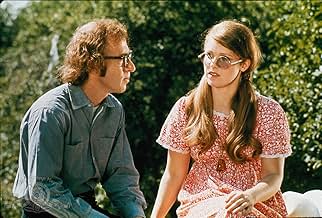VALUTAZIONE IMDb
6,9/10
38.611
LA TUA VALUTAZIONE
Quando un maldestro newyorchese viene scaricato dalla sua fidanzata attivista, si reca in una piccola nazione latinoamericana e viene coinvolto nella sua ultima ribellione.Quando un maldestro newyorchese viene scaricato dalla sua fidanzata attivista, si reca in una piccola nazione latinoamericana e viene coinvolto nella sua ultima ribellione.Quando un maldestro newyorchese viene scaricato dalla sua fidanzata attivista, si reca in una piccola nazione latinoamericana e viene coinvolto nella sua ultima ribellione.
- Premi
- 2 candidature totali
Nati Abascal
- Yolanda
- (as Natividad Abascal)
Miguel Ángel Suárez
- Luis
- (as Miguel Suarez)
René Enríquez
- Diaz
- (as Rene Enríquez)
Tigre Pérez
- Perez
- (as Tigre Perez)
Trama
Lo sapevi?
- QuizSylvester Stallone appears uncredited as a subway thug. This was one of his earliest film roles, not a cameo. According to website Every Woody Allen Movie, "Allen initially sent Stallone back to the casting agency after deciding he wasn't 'tough-looking' enough. Stallone pleaded with him and eventually convinced him to change his mind".
- BlooperWhen Mellish accidentally injects everyone with sodium pentothal during an abduction on a street in San Marcos, there is a blue station wagon parked in front of them with a New York State license plate.
- Citazioni
Nancy: You're immature, Fielding.
Fielding Mellish: [whining] How am I immature?
Nancy: Well, emotionally, sexually, and intellectually.
Fielding Mellish: Yeah, but what other ways?
- Curiosità sui creditiIn the opening credits, the credits flash in time to the music. Additionally, the cards are shot with machine gun fire.
- ConnessioniFeatured in The Dick Cavett Show: Woody Allen (1971)
- Colonne sonoreQuiero La Noche
Words and music by Marvin Hamlisch
Sung by The Yomo Toro Trio
[Played during the opening titles and credits]
Recensione in evidenza
When asked why he titled his third feature-length picture 'Bananas,' Woody Allen replied, "because there's no bananas in it." This, in a nutshell, pretty much summarises the general tone of the film. During the first ten years of his directing career, it's interesting to see Allen slowly developing his craft; as the years go by, from 'Take the Money and Run (1969)' to 'Sleeper (1973),' {and culminating in 'Annie Hall (1977)'} we notice how he learned to assimilate an unrelated collection of gags into a mature, cohesive narrative. 'Bananas (1971)' sits somewhere in the middle of all this, with a more developed story than its predecessors, but maintaining its roots as an anarchic comedy, much in the same vein as films like 'Duck Soup (1933)' and 'Monty Python and the Holy Grail (1975).' Though I had not anticipated enjoying 'Bananas' very much, I must say that the film provided countless moments of immeasurable hilarity. Though slightly uneven in parts {as is often the case, some jokes hit while others miss}, the film delivers the promised laughs.
The storyline is characteristically simple and absurd. After a revolution breaks out in the small South American nation of San Marcos, a mediocre, unintellectual New Yorker, Fielding Mellish (Allen), travels there to impress his ex-girlfriend (Louise Lasser). After the fascist government tries to have him assassinated, poor Fielding falls in with the rebel gangs, somehow eventually becoming the President of the Latin American republic. This absurd plot line allows Allen to pile one gag on top of another, and, interestingly, the story itself never seems to lose its way or go off on any tangents. The film's satirical take on war, with the Vietnam War still raging in 1971, was very timely, and Allen also aims a few jabs at the media's handling of warfare in the ridiculous and inspired opening, ABC's Wide World of Sports arrives in San Marcos to commentate the assassination of the current President. Later, Howard Cosell returns to host the consummation of Fielding's marriage, with an enthusiastic crowd watching the awkward couple tussling beneath the covers. 'Bananas' is a type specimen of one of Woody Allen's "early, funny movies."
The storyline is characteristically simple and absurd. After a revolution breaks out in the small South American nation of San Marcos, a mediocre, unintellectual New Yorker, Fielding Mellish (Allen), travels there to impress his ex-girlfriend (Louise Lasser). After the fascist government tries to have him assassinated, poor Fielding falls in with the rebel gangs, somehow eventually becoming the President of the Latin American republic. This absurd plot line allows Allen to pile one gag on top of another, and, interestingly, the story itself never seems to lose its way or go off on any tangents. The film's satirical take on war, with the Vietnam War still raging in 1971, was very timely, and Allen also aims a few jabs at the media's handling of warfare in the ridiculous and inspired opening, ABC's Wide World of Sports arrives in San Marcos to commentate the assassination of the current President. Later, Howard Cosell returns to host the consummation of Fielding's marriage, with an enthusiastic crowd watching the awkward couple tussling beneath the covers. 'Bananas' is a type specimen of one of Woody Allen's "early, funny movies."
I più visti
Accedi per valutare e creare un elenco di titoli salvati per ottenere consigli personalizzati
- How long is Bananas?Powered by Alexa
Dettagli
Botteghino
- Budget
- 2.000.000 USD (previsto)
- Lordo in tutto il mondo
- 136.200 USD
Contribuisci a questa pagina
Suggerisci una modifica o aggiungi i contenuti mancanti

Divario superiore
By what name was Il dittatore dello stato libero di Bananas (1971) officially released in India in English?
Rispondi


















